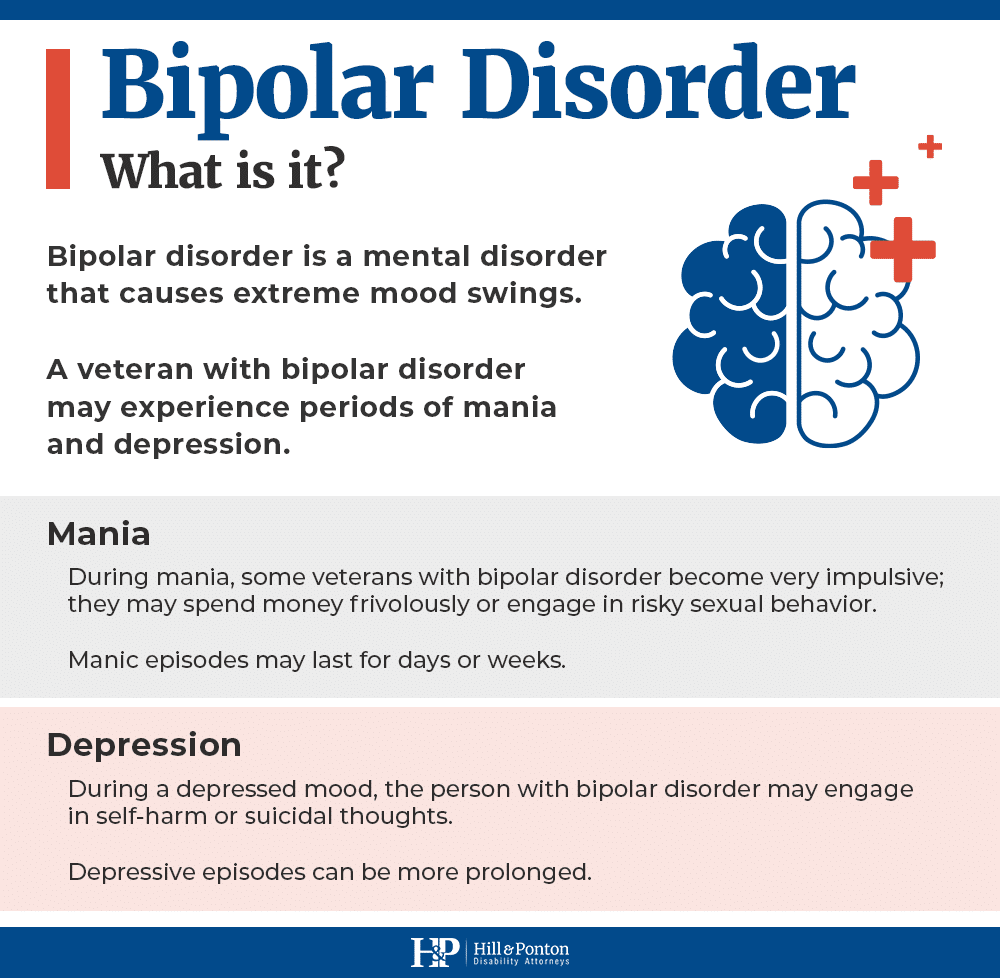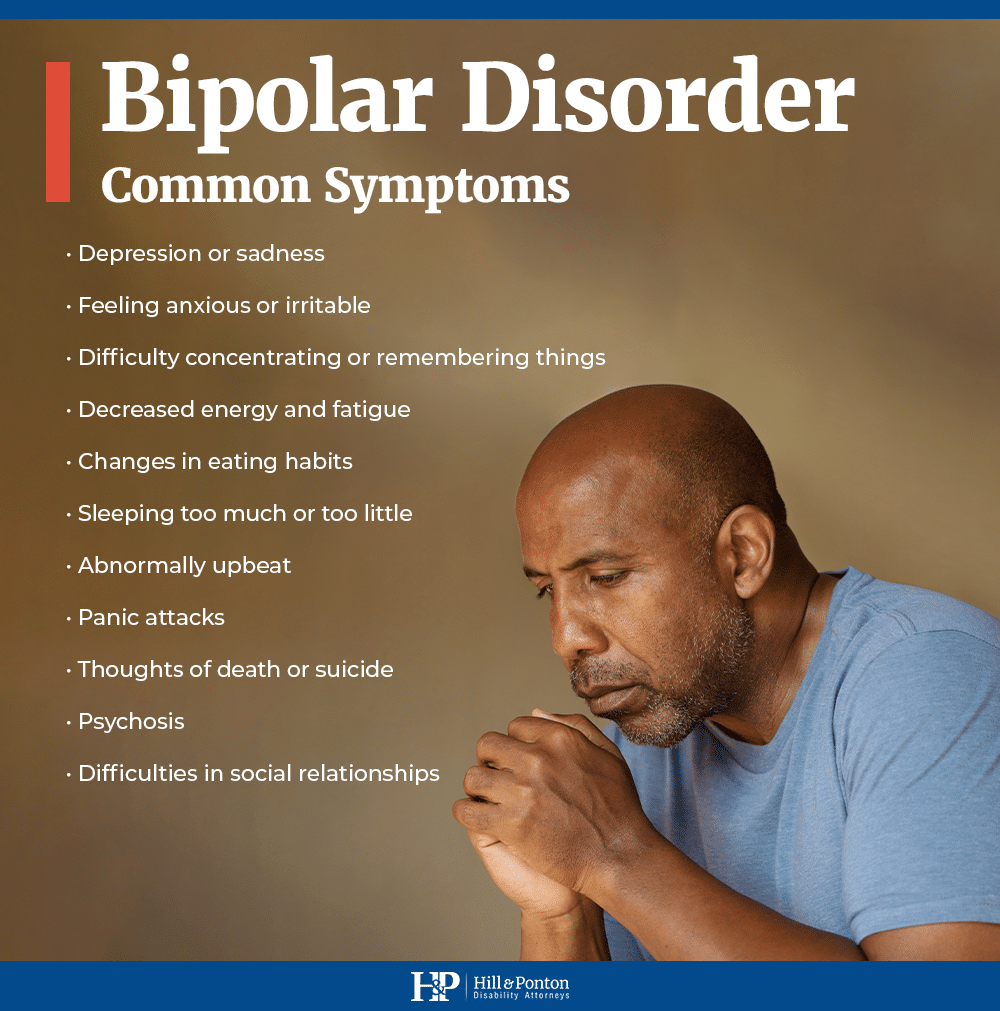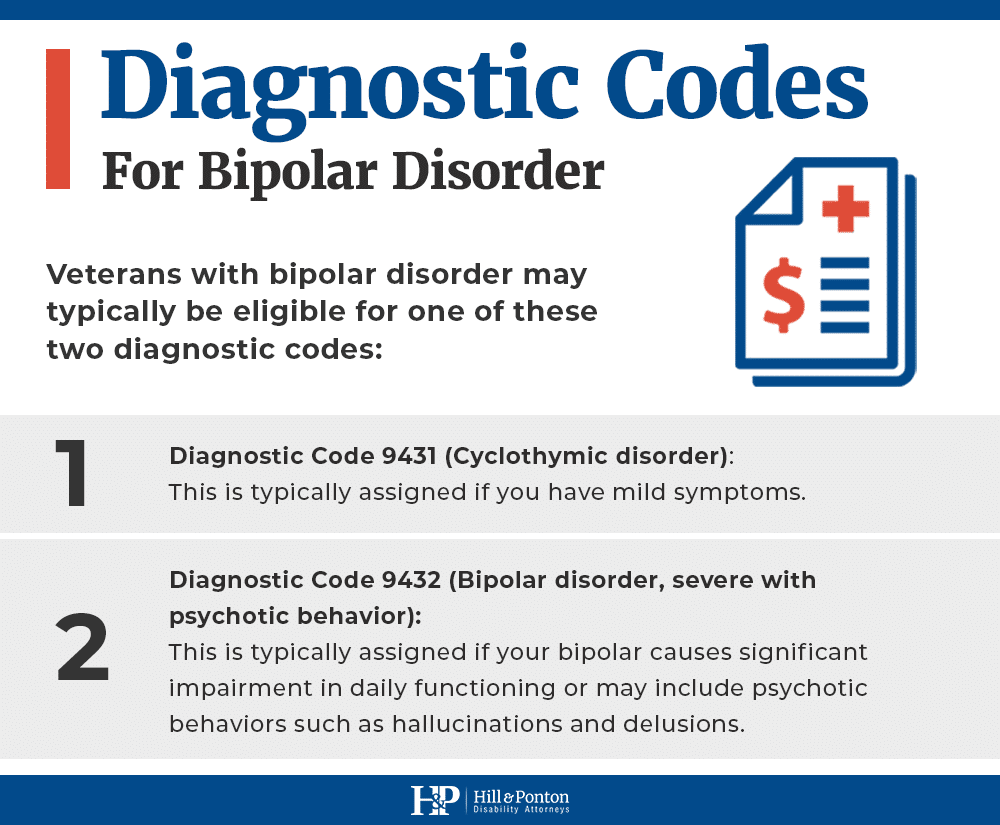Bipolar disorder is a serious mental illness that can have a significant impact on one’s life. It can cause mood swings, depression, and episodes of mania. Unfortunately, many veterans with bipolar disorder are not able to work because of their condition. If you are a disabled veteran unable to work due to bipolar disorder, you may be eligible for VA disability compensation.
In this article, we will discuss VA disability ratings for bipolar disorder and how to establish service connection with VA disability claims. Bipolar disorder is a mental illness that is characterized by mood swings.
The veteran with bipolar disorder may experience periods of mania, which is an elevated or irritable mood, and periods of depression, which is a low or sad mood. Some veterans with bipolar disorder also have episodes of psychosis, which can include hallucinations or delusions.
Bipolar disorder is also known as a manic depressive disorder. Let’s get into how Bipolar is characterized, the current veterans law, and VA disability benefits below.
What Is the VA Rating for Bipolar Disorder?
The VA disability rating for bipolar disorder ranges from 0% to 100%, depending on the frequency, severity, and impact on daily life and ability to work. The maximum bipolar disorder VA rating is 100% and is given for total impairment due to persistent delusions, severe memory loss, being a danger to oneself or to others, etc.
Zero Percent – 0%: This means your bipolar disorder has no disabling effects. (i.e. completely controlled)
Mild (30 percent) – Symptoms include abnormal mood swings, unusual talkativeness or irritability, racing thoughts and agitation. The veteran can still function in a work setting with some adjustments.
Moderate (50 percent) – Symptoms include marked mood swings, frequent outbursts of anger, impulsiveness, poor decision-making and significant problems with concentration. The veteran may be able to work but would need special accommodations.
Severe (70 percent) – Symptoms include extreme mood swings, suicidal thoughts or attempts, self-mutilation, psychosis and inability to take care of oneself. The veteran is considered totally disabled and unable to work.
Total (100 percent) – The veteran experiences an extreme form of bipolar disorder that requires hospitalization. This is the most severe level of VA disability rating for bipolar and typically only applies to those who are in a constant state of psychosis or suicidal ideation. The veteran is considered totally disabled and unable to work.
Diagnostic Code used for Bipolar Disorder VA disability rating
Veterans with bipolar disorder may typically be eligible for one of these two diagnostic codes:
- Diagnostic Code 9431 (Cyclothymic disorder): This is typically assigned if you have milder symptoms as characterized above.
- Diagnostic Code 9432 (Bipolar disorder, severe with psychotic behavior): This is typically assigned if your bipolar causes significant impairment in daily functioning or may include psychotic behaviors such as hallucinations and delusions. It also has a greater restriction on gainful employment than the first option.
What is Bipolar Disorder? (Manic Depression)
Like we said above, Bipolar disorder is a mental disorder that causes extreme mood swings. A veteran with bipolar disorder may experience periods of mania. Mania is an elevated mood where the person feels more energetic, happy, and excited than usual. The veteran may also feel irritable or angry.
What is mania?
During mania, some veterans with bipolar disorder become very impulsive; they may spend money frivolously or engage in risky sexual behavior. They may have difficulty concentrating on tasks at hand because of racing thoughts. Manic episodes may last for days or weeks.
What is depressed mood?
Depressed mood is characterized by feelings of sadness, anxiety, guilt, or low self-esteem. The person may have difficulty concentrating or making decisions. During a depressed mood, the person with bipolar disorder may engage in self-harm or suicidal thoughts. Depressive episodes can be more prolonged.

Statistics on Bipolar Disorder
Bipolar disorder affects approximately five million Americans every year. These type of mental disorders can lead to very stressful situations and problems in many veterans’ lives. Disabled veterans with mental health conditions may be unable to work due to the intermittent inability to self-regulate your mood appropriately to the situation. There are three common types of Bipolar Disorder.
- Bipolar I Disorder is a disorder characterized by manic episodes that last at least one week (or require hospitalization), and often include depressive symptoms.
- Bipolar II Disorder is a disorder characterized by less severe manic episodes called “hypomania” and major depression.
- Cyclothymic Disorder, also known as cyclothymia, is a disorder characterized by a history of numerous periods of hypomania and depression that do not meet the full diagnostic criteria for bipolar I or II.
Common Symptoms of Bipolar Disorder
Because mental health conditions in veterans can manifest themselves very similarly, it can be hard to attribute certain symptoms and get treatment for the proper issues. Below are common symptoms that veterans may experience in no particular order.
- Depression or sadness (e.g., feeling hopeless, guilty, worthless)
- Feeling anxious or irritable. Impaired impulse control. (Manic episode)
- Difficulty concentrating or remembering things. Impaired judgment.
- Decreased energy and fatigue.
- Changes in eating habits (e.g., loss of appetite, overeating)
- Sleeping too much or too little, also known as chronic sleep impairment.
- Abnormally upbeat with rapid and/or illogical speech
- Panic attacks
- Thoughts of death or suicide
- Psychosis (e.g., hallucinations, persistent delusions.
- Difficulties in social relationships
Bipolar disorder can have a significant impact on veterans’ daily living including occupational and social functioning, difficulty maintaining relationships and taking care of themselves. If you are unable to work due to bipolar disorder, you may be eligible for service connected bipolar disorder VA disability compensation.
To qualify for a VA rating and disability benefits, you must establish that your bipolar disorder is service connected. This means that there must be a link between your bipolar disorder and your military service.

How To Establish Service Connection for Bipolar Disorder
There are several ways to establish service connected disabilities like bipolar disorder in a veteran’s claim. The most common ways are to show that the condition was either directly caused or aggravated by your military service.
If you can link to a direct event or incident in the military and can show how your Bipolar Disorder developed over time as a result, then that would be known as direct service connection.
Many times, it can be hard for the veteran to show specific incident or injury. You could still try getting service connection through aggravation or a secondary issue.
Service Connection for Bipolar Disorder through Aggravation
If your bipolar disorder was aggravated by military service, this means it existed before your military service but got worse during active duty. The easiest way to establish that a condition was aggravated by your military service is to go find records that can help corroborate your history.
For example, “I was diagnosed bipolar at a relatively early age before service and it didn’t mark any red flags during the recruitment checkup. Now, I’m really struggling with intrusive thoughts or elevated mood swings.” If you have a doctor’s note from before and after enlistment, this can be very helpful in establishing aggravation of a previously diagnosed issue that indeed worsened.
Service Connection for Bipolar Disorder through a Secondary Issue
If veterans can’t prove that their bipolar disorder was directly caused or aggravated by military service, they may still be able to get benefits if they can show that it is related to another disability that was caused or aggravated by military service. For example, many veterans with bipolar disorder also have a traumatic brain injury.
If you went through combat, a car accident, bomb blast, IED, etc. and experienced serious head trauma, that could lead to not only physical issues but also mental ones; your bipolar disorder could be secondary to the TBI.
Compensation & Pension Exam for Bipolar Mental Disorders
If you have a VA service connection disability claim for bipolar disorder, the VA will send you to a VA doctor for an exam at some point during your disability claim. This could also apply for veterans who already have been granted service connection for their condition and is appealing the VA rating. This is what’s known as a Compensation & Pension (C&P) Exam for Disability Benefits.
A Compensation & Pension exam is an important part of your claim and can help support it. The doctor will evaluate the severity of your bipolar disorder, at which point they are required to complete a C&P examination report that lists all their findings including personal appearance. They may also do a mental status exam or other diagnostic tests.

Evidence to Help Prove your VA disability Claim
Make sure you are as detailed as possible about your history and mental condition symptoms; look up your medical records and help prove your claim of an in service event that can be linked to your Bipolar diagnosis. Do you require continuous medication?
Can you as a disabled veteran maintain relationships? The veteran population is acutely aware of the threat of persistent danger, high stress situations, and social difficulties upon returning home from war.
Buddy statements can be incredibly helpful for service connection on your mental health claim if fellow veterans who served with you are willing to write a statement in support of your VA claim. Those can be useful to bring to the exam as well. The doctor will also write up a narrative opinion where they attest to whether you meet the criteria for a certain disability rating, which can be anywhere from 0% – 100%.
TDIU for Bipolar Disorder and Mental Health Conditions
Veterans who receive a rating of 70 percent or higher for their Bipolar Disorder are eligible for TDIU benefits, which can provide monthly compensation on the basis of individual unemployability.
This type of claim allows those with severe mental or physical disabilities to receive a higher monthly compensation than they would be eligible for based solely on the rating schedule. If you are unable to work because of your bipolar disorder, the VA may consider your condition “total” and award total disability benefits at 100 percent.
This means you would receive the same monthly compensation as if you were rated totally disabled. In conclusion, I hope this information is helpful.
Get a Free Case Evaluation
If you are a veteran with bipolar disorder, it is important to understand how the VA rates it and what benefits you may be eligible for. Make sure you provide as much detail as possible about your symptoms and history when meeting with your doctor for a C&P examination. If you need help with an appeal, please do not hesitate to contact us.




